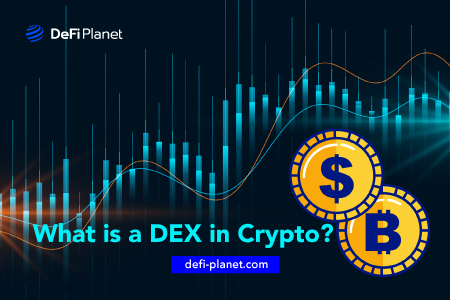Last updated on March 24th, 2022 at 01:42 pm
Crypto exchanges are crucial components in the crypto sector as token holders may want to trade their tokens for fiat or other cryptocurrencies. Traders can trade their cryptocurrency holdings in a variety of methods. This can be done through a centralized or custodial exchange or a decentralized exchange. The former is usually controlled by a custodial authority and holds the tokens that are being traded.
This article analyzes the concept of a decentralized exchange, its benefits, drawbacks, as well as a comparison to centralized exchanges.
What is DEX?
A decentralized exchange, often known as a DEX, is a cryptocurrency exchange that is not governed by custodial authorities. It can consist of enthusiasts trading with one another or trading with a smart contract. The former is a peer-to-peer exchange, while the latter is an Automated Market Maker (AMM).
Different types of decentralized exchanges exist but they all share the element that allows users to trade without the involvement of a centralized authority. Common examples of decentralized exchanges include UniSwap, Pancakeswap, Fomo Dex, and Sushiswap.
How does a DEX work?
There are different types of decentralized exchanges and they operate in different ways.
• Peer-to-peer exchanges
Peer-to-peer exchanges are a sort of decentralized exchange that allows individuals to trade with one another. A potential buyer may opt to place an order on a decentralized exchange, which connects them to a seller. Both parties carry out their deals without the involvement of a centralized authority. The peer-to-peer trading platform may include a decentralized escrow system, such as a multi-sig wallet, allowing them to conduct decentralized transactions in a secure environment.
• Automated Market Makers (AMMs)
Automated Market Makers are designed to allow users to trade against a smart contract. This type of decentralized exchange is run by liquidity pools. Liquidity is a common issue in decentralized exchanges and the concept of AMMs solves this issue. Liquidity pools are set up and run by smart contracts. People are convinced to inject liquidity into the pool to earn rewards which could be transaction fees from traders or new governance tokens.
In the case of an AMM, the trader is trading against smart contracts that determine the value of the tokens in the pool. Traders pay transaction fees for using the pool. This type of DEX allows the permissionless listing of tokens by crypto platforms.
To use this type of DEX, the trader simply connects their wallet to the AMM and swaps their tokens.
Decentralized Exchange (DEX) vs Centralized Exchange (CEX)
Decentralized exchanges and centralized exchanges are similar in that they both allow people to seamlessly trade one token for another. They also have some differences.
• Popularity
Because centralized exchanges have been around longer, they are more popular than decentralized exchanges. People are accustomed to exchanging tokens on centralized exchanges such as Binance and Coinbase.
Although Bitcoin has been available since 2009, the first decentralized exchange was launched in 2014, and people were used to centralized exchanges before that. The NXT Exchange is the first decentralized exchange.
• Liquidity
Centralized exchanges are known to have better liquidity than their DEX counterparts. This is one of the reasons why the concept of AMM was developed to inject liquidity and reward those who did so.
• Regulation
With the expansion of the crypto space, several regulatory authorities are now publishing guidelines and laws governing the use of cryptocurrency and the establishment of crypto-related platforms. Centralized crypto exchanges are expected to apply for a license in a region before they can offer their services to residents of that region.
Because of the decentralization of DEX, it is difficult to regulate them, and they may not require a license to operate in a country.
• Trading options
Compared to DEX, centralized exchanges are known to provide more trading options for traders. Swapping and providing liquidity are two popular trading features on a decentralized exchange. It is difficult to find a DEX that allows customers to trade margin, futures, derivatives, and other trading options.
• Transaction fees
Centralized exchanges charge fees for carrying out transactions on their platforms. It can be based on the amount being swapped or the other activities that are being done. Decentralized exchanges charge little or no fees when using their platforms. AMMs typically charge transaction fees, but not every peer-to-peer trading platform charges fees.
• Transaction speed
Transactions on centralized exchanges are swift as a result of the high liquidity. It only takes seconds, which is not true of many decentralized exchanges. If the platform is peer-to-peer, it may take some time to find a counterparty, such as a seller or a buyer, willing to trade the required amount of tokens.
• Security level
Because of its custodial nature, hackers prefer to attack centralized exchanges over decentralized exchanges. They typically target the hot wallets of these exchanges, which are required for the platform’s fast transactions. Eterbase’s loss of $5 million due to hot wallet exploitation.
Though decentralized exchanges, particularly their liquidity pools, are targeted, the cases are not as common as the exploitation of loopholes in centralized exchanges
Advantages of DEX
• Permissionless listing
Users can list any token that they wish on decentralized exchanges. This is possible with AMMs, as long as the platform has a liquidity pool.
Before a token can be listed on a centralized exchange, it must undergo a more rigorous process. The tokenomics of the token, as well as the team, must have been thoroughly investigated. Larger centralized cryptocurrency exchanges have strict requirements that must be satisfied before a project’s token can be listed on them. In some cases, this may involve paying the exchange and allocating a percentage of native tokens to them.
• Multiple tokens
Decentralized exchanges are home to multiple tokens, particularly new ones. Traders hunting for new tokens with great potential may find them on an AMM. Because of the permissionless listing features, various cryptocurrency startups list their coins on a DEX.
• Anonymity
Centralized exchanges require people to upload identification documents as well as proof of residency documents, depending on the regulations for operating in different countries. This eliminates trading anonymity.
Users on decentralized exchanges are anonymous because they are not required to sign up or go through any KYC process. To exchange and swap tokens, users simply need to connect their wallets. It’s that simple. With the concept of DEX, the veil of anonymity is maintained.
Disadvantages of a DEX
• Lack of liquidity
Liquidity is a major concern with decentralized exchanges, resulting in slippage. It can be disconcerting to trade a token with little liquidity in its pool.
• Transaction speed
Transaction speeds are slow, especially on peer-to-peer trading platforms, because buyers and sellers must seek the other end of their transactions.
• Unvetted tokens
Centralized exchanges tend to vet the tokens listed on their exchanges, reducing the risks of trading those tokens. Decentralized exchanges do not usually vet token listings because of the permissionless feature.
• Smart contract risks
Smart contracts control the operations of an AMM. When hackers discover bugs or vulnerabilities to a liquidity pool, they can drain its liquidity.
Can DEXs be regulated?
Proponents of decentralized exchanges say that DEXs cannot be regulated, especially in light of the regulations that govern centralized exchanges. DEXs, for example, are well-known for being open-source and not controlled by centralized authorities. Who then would ensure that the architecture of decentralized exchanges adheres to guidelines?
Currently, little has been done to regulate decentralized exchanges, although this may change in the future as DEXs gain prominence.
Some Popular DEXs
• Uniswap
UniSwap is one of the largest existing decentralized exchanges built on the Ethereum blockchain. It is home to a plethora of ERC20 tokens, and newer DEXs tend to fork or clone its architecture.
• Pancakeswap
Pancakeswap is one of the largest AMMs on the Binance Smart Chain. It was designed to provide functions similar to UniSwap. The main difference is that it accepts BEP20 and BEP2 tokens, as well as other Binance Smart Chain tokens.
• Sushiswap
Sushiswap is an AMM on the Ethereum network and a fork of UniSwap. It offers liquidity pools like UniSwap.
In Conclusion,
- Decentralized exchanges eliminate the need for centralized authorities.
- A DEX can be a peer-to-peer trading platform or an Automated Market Maker.
- Sushiswap, Pancakeswap, and UniSwap are examples of common DEXs.
- DEXs enable people to trade anonymously, but this has drawbacks.
If you would like to read more articles like this, follow DeFi Planet on Twitter, LinkedIn and Facebook.




















